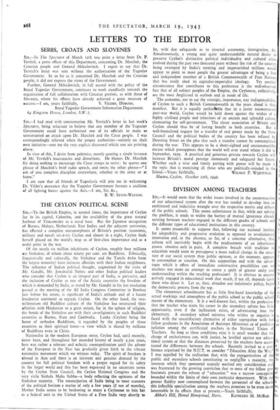THE CEYLON POLITICAL SCENE
SIR,—To the British Empire, in normal times, the importance of Ceylon lay in its capital, Colombo, and the availability of the great natural harbour of Trincomalee as a naval base. But the Japanese occupation of Burma, Malaya, Netherlands East Indies and the adjacent territories, has effected a complete metamorphosis of Britain's position (economic, military and naval) vis-d-vis Ceylon and almost in a night, Ceylon finds herself placed on the world's map as of first-class importance and as a nodal point in the war.
Of the nearly six million inhabitants of Ceylon, roughly four millions are Sinhalese, of whom about ninety per cent. are Buddhists. Ethnically, linguistically and culturally, the Sinhalese and the Tamils (who form the largest minority) have intimate affinities with their Indian neighbours. The influence of Indian political thought, augmented by the visits of Mr. Gandhi, Mr. Jawaharlal Nehru and other Indian political leaders who consider that Ceylon is an integral part of India, is pervasive, and the inclusion of Ceylon as one of the Asiatic countries the freedom of which is demanded by India, as stated by Mr. Gandhi in his last resolution passed at the meeting of the All India Congress Committee in Bombay just before his arrest, is significant of India's attitude and of a future Irredentist sentiment as regards Ceylon. On the other hand, the two- millennium old Buddhist culture of the Sinhalese has neutraised their affinities with Hindustan to a great extent, for in the sphere of religion, the bonds of the Sinhalese are with their co-religionists in such Buddhist countries as Burma, Siam and Cambodia. Lanka (Ceylon) being the home of orthodox Buddhism, is regarded by the peoples of those countries as their spiritual home—a view which is shared by millions of Buddhists even in China.
Nationalist in the modern European sense, Ceylon had, until recently, never been, and throughout her recorded history of nearly 2,5oo years, hers was rather a tolerant and eclectic cosmopolitanism until the advent of the European in the East has gradually given birth to the vibrant nationalist movement which we witness today. The spirit of freedom is abroad in Asia and there is an insistent and genuine demand by the country for full political freedom with a proper regard for its safety in the larger world and this has been expressed in no uncertain terms by the Ceylon State Council, the Ceylon National Congress and the very virile Sinhala Maha Sabha—a body reflecting the opinions of the Sinhalese majority. The emancipation of India being to most scanners of the political horizon a matter of only a few years Cif not of months), Mother India seems to be beckoning to many a Ceylonese to join her as a federal unit in the United States of a Free India very shortly to
be, with due safeguards as to internal autonomy, immigration, &c. Simultaneously, a strong and quite understandable natural desire to preserve Ceylon's distinctive political individuality and cultural ethos evolved during the past two Thousand years without the risk of the country being swamped by India's teeming and impoverished millions would appear to point to most people the greater advantages of being a free and independent member of a British Commonwealth of Free Nations that has really shed its capitalist-imperialist ideology. Yet another circumstance that contributes to this preference is the well-observed fact that of all subject peoples of the Empire, the Ceylonese, collectively, are the most Anglicised in outlook and in mode of life.
The economic, not to say the strategic, importance, nay indispensability, of Ceylon to such a British Commonwealth in the years ahead is thus manifest. But it is equally unthinkable that in a juster reconstructed post-war *orld, Ceylon would be held down against the wishes of a highly civilised people and inheritors of an ancient and splendid culture clamouring for self-government. The closer association of Britain and Ceylon should thus be of lasting benefit to both countries. But a well-formulated request for a transfer of real power made by the State Council and the political bodies of the country has been refused by Downing Street on the plea that such a transfer cannot be contemplated during the war. This appears to be a short-sighted and unstatesmanlike excuse which presupposes that the world will ever stand where it did in September, 1939. A practical and generous gesture towards Ceylon will increase Britain's moral prestige immensely and safeguard her future. Whether such a wise and timely parting with power will be made is the topic that is exercising all those who are politically-minded in the Island.—Yours faithfully, WILMOT P. WIJETUNGE.
Matara, Ceylon. October 12th, 1942.


























 Previous page
Previous page